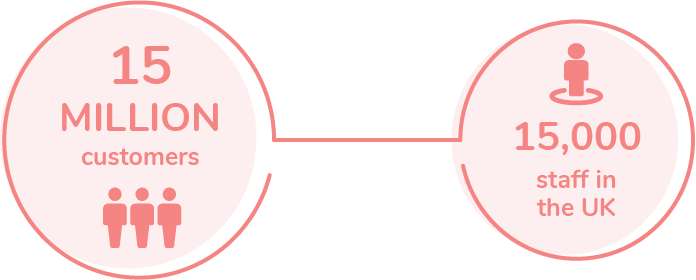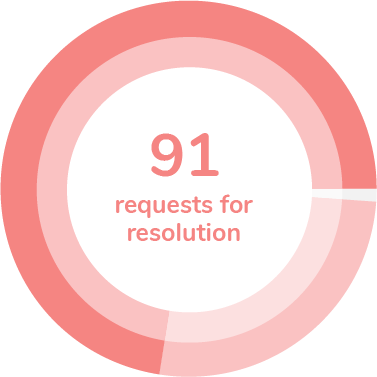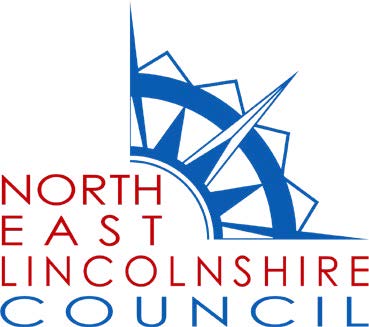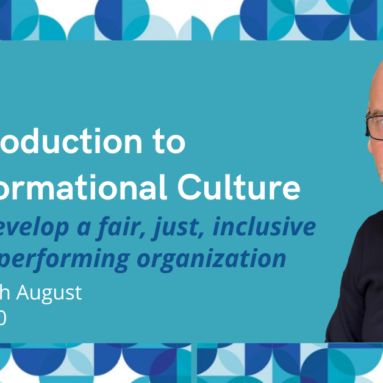

Download this case study


Read more case studies:
Changing Culture with Aviva
Introducing a Resolution Framework™.
Aviva is the UK’s largest insurance company, with over 15 million customers and 15,000 staff in the UK. Aviva recognises looking after its people means they will in turn look after customers. This sentiment is central to the ethos at The TCM Group, which believes strongly in a people-centred, values-led and compassionate approach to resolving conflict. The TCM Group is an award-winning provider of mediation, investigation, transformational culture change and leadership development services and training to UK and global companies. With a panel of world class consultants and a passionate head office team, TCM excels in helping companies to integrate a fair, just, sustainable, inclusive and high performing culture.

The challenge
Conflict is an inevitable part of working life. A recent Acas report, Estimating the Cost of Conflict, suggests that almost 10 million people experience conflict at work – with over half suffering from stress, anxiety or depression as a result. The cost, both human and financial, is huge, adding up to £28.5 billion – that’s the equivalent of more than £1,000 per employee, per year.
No organisation is immune – and in 2018, results from employee engagement surveys at Aviva suggested the way the business was dealing with these workplace conflicts was at odds with its wellbeing culture. Feedback from staff showed that issues were rumbling under the surface until they reached the point where the only solution was to invoke a standard grievance procedure.
Aviva recognised that taking people through lengthy and bureaucratic formal processes was not only time-consuming and costly but was also having a negative impact on employee mental and physical health. This approach to dealing with what often started out as minor disagreements was fostering anxiety. Issues were being allowed to escalate and working relationships were deteriorating, with a corresponding impact on morale and motivation, not just for the parties involved, but also for those around them. As stress levels rose, people embroiled in conflicts often went off sick, leading to a decline in productivity and the formal process becoming even more protracted.
This approach was not resulting in anyone ‘winning’. Often workplace relationships were irretrievably damaged, and the employees involved felt that nothing had really been resolved.
Managers needed help to spot and nip issues in the bud, encourage healthy dialogue in teams, and ensure staff were able to fulfil their potential and do their best work. Equally, individuals needed the skills and encouragement to take personal responsibility for sorting out disagreements in a collaborative, compassionate way.
Achieving this cultural shift, however, would call for more than just minor tweaks to policies and processes. A large-scale cultural transformation in the way workplace relationships were managed and disagreements were resolved was needed.
After an initial internal scoping exercise, a decision was taken to look for an HR/change consultancy who could work in close partnership with Aviva to develop a response which would fit with the Aviva brand, values and ethos and which would encourage and embed the significant behavioural changes the business wanted to see.
TCM’s offer stood out when benchmarked against other providers, because of the consultancy’s deep understanding of the psychology of conflict, and its focus on practical tools and frameworks to help organisations redefine the way they resolve disputes. The company’s strong track record in the market was also appealing. In its 20-year history, TCM has worked with almost 2K companies and has secured several awards, including Personnel Today Best HR Consultancy in 2020.
Managing and embedding change
At the time of the Resolution Programme’s inception, Aviva was in the midst of a major organisational change and cultural transformation initiative and had just launched its new corporate values. A key priority for the HR team was to ensure the work they were doing on resolution was a good fit with Aviva’s mission and strategy and that it reflected the values.
The new approach also needed to fit with organisation’s mission statement below, by making sure the business was there for people when it needed them. The new approach also needed to fit with organisation’s mission statement below, by making sure the business was there for people when it needed them.
“We protect people each day. We help people get on with their lives. We support them. With you today for a better tomorrow”.
This ethos is underpinned within Aviva by a set of four core values that drive the way the organisation interacts with both its customers and its people: care, commitment, community and confidence.
The HR team was also clear that the new approach had to complement its wider strategy for managing and supporting the wellbeing of its employees. As part of the cultural change, a lens was put across all employment policies, to ensure they were supporting people and treating them as individuals, as well as playing a part in attracting and retaining talent.
Aviva is well known for its equal parental leave policy, and also has a policy for supporting carers and employees experiencing domestic abuse. On diversity and equality, the business is a signatory of the Women in Finance Charter, the 30% club and the Race at Work charter.
Particularly relevant to the Resolution programme, is Aviva’s ‘Speak Up’ culture which runs across the business, with zero tolerance for retaliation against anyone who speaks up or raises a concern and multiple channels for employees to report suspected unethical or illegal behaviour across its operations or supply chain.
At the start of the programme, Aviva was dealing with 132 formal grievances, with 10 having gone through to appeal stage. On the surface, this may not sound unreasonable against a workforce of 15K people, but the HR team was not content to accept that level of cases, because of the impact on people, the amount of time and resource involved and the knock-on effect on customers.
The key objectives of the programme were;
- To bring about a cultural shift in the way colleagues inter-acted with each other, managed workplace relationships and dealt with disagreements.
- To design and implement an over-arching resolution framework which would provide a menu of options for resolving disputes, with the emphasis on informal, people-centred and values-driven approaches.
- As a result of this transformation, to achieve a significant reduction in the number of disputes going through formal process.
Overcoming resistance
It was agreed that TCM and Aviva would work closely together to develop a new framework for resolving disputes, which was fair, just, people-centred and values-led. This would be based on the principles of TCM’s ground-breaking Resolution Framework, which replaces the discipline, performance and grievance procedures with one all-encompassing policy. It delivers a shift in focus towards restorative justice, with dismissal only used as a carefully considered last resort, for the greatest levels of employee experience and transformational change.
An initial budget of c£32K was allocated to support the development and launch of the programme.
The first step was to conduct a detailed desk-top analysis of the costs and causes of conflict. This involved running TCM’s Conflict Calculator across five existing grievance cases to get to the root of what was causing disputes at work and highlight how much the current approach was ‘costing’ the business, particularly in terms of employee resource.
After an initial deep dive, the following key deliverables for the project were agreed:
- Collaboration between TCM and Aviva to build a resolution framework tailored to the organisation’s specific needs and context.
- Collaboration on setting up an in-house mediation programme, with a cadre of fully trained, internal mediators.
- Development by TCM of three hour-long webinars for supervisors, line managers and local union reps, designed to help delegates learn how to spot and manage conflicts.
- Delivery by TCM of x 2 three-day Routes to Resolution training courses, designed specifically to equip HR, union reps and other stakeholders with a detailed understanding of the benefits, features, advantages and limitations of different resolution approaches.
- Delivery of the six-day accredited National Certificate in Workplace Mediation, for an initial cohort of x12 internal mediators.
- Collaboration over the development of content to support the programme launch, which would also feed into modules hosted on Aviva University.
- Delivery of a one day managing conflict masterclass for the senior management team.
- Advice and collaboration on development of a resolution case management system.
Regular check ins and review meetings were scheduled to monitor progress and adjust the approach if needed. The emphasis was on getting the programme right, rather than trying to adhere to a rigid timetable.
The task of embedding this new approach across a workforce of 15k people, spread across eight major sites and satellite offices from Glasgow to Southampton, cannot be under-estimated. The Aviva team had to work closely with marketing colleagues to exploit the full range of internal communication channels to get the message about the new approach across. They had to draw on a combination of virtual, face to face and e-learning approaches to ensure staff were equipped with the necessary skills to support the change. The L&D team, which sits within the HR directorate, also needed to ensure that this cultural shift was reflected in all its training programmes, from induction sessions for new starters through to line manager training and management development programmes.
The initiative
Programme design, structure and delivery
Stakeholder engagement: The team was clear that getting buy-in from key stakeholders right from the start would be integral to the success of the programme. Securing support across the business would not only ensure key players understood the rationale for change but would also encourage them to become ambassadors for the new approach.
An extensive series of meetings were held with key stakeholders including leaders, trade unions, employee representatives and individuals. This combined collaborative lens was used to construct a Resolution Framework directly tailored to Aviva’s needs.
Support for the new approach was wholly positive across the piece, with the programme being signed off at senior level by the HR Executive Director The union (Unite) did have some initial concerns about the support they would be able to provide to their members within the framework, but these were quickly allayed, and union reps are now one of the biggest supporters of the new approach.
Designing the Resolution Framework: The team worked together to design and finalise a Resolution Framework that would take the word ‘grievance’ completely out of the Aviva lexicon and give managers a menu of compassionate and collaborative options to draw from when dealing with disagreements.
Establishing the support team: A small team of advisers, drawn from within the HR team, were put together to support implementation of the new programme. These advisers are the first port of call for employees, who are encouraged to raise issues via a dedicated mailbox.
The Resolution Team conduct a triage of each case, working with the employee to come to an agreement around the best approach for them to resolve their issues. The triage generally results in leading parties in one of three distinct directions – a facilitated conversation, mediation or, in the rare number of cases where this is required, formal resolution.
Training key players: A whole range of training workshops were held, ranging from a masterclass for senior leaders and a ‘Routes to Resolution’ course for HR/union/key players through to webinars for line managers.
Establishing in-house mediation capability: TCM and Aviva also worked closely together to select and train an internal cadre of mediators, who could support colleagues when mediation was deemed to be an appropriate route. Mediators (who conduct this role in a voluntary capacity) were drawn from all parts of the business and from a variety of backgrounds and seniority. Having a diverse pool helps to build trust among employees and ensures there will always be a neutral party to mediate. In total, 24 mediators have attended TCM’s externally accredited National Certificate in Workplace Mediation.
Supporting skills development: The L&D team were able to draw from the content of the Resolution Programme to develop a suite of e-learning modules and materials around six key topics – effective communication, managing conflict, having difficult conversations, managing emotions and resilience, self-awareness, and managing team conflict. This is helping managers develop the core skills to reduce and manage conflict within their teams.
Communication and engagement: The vision for a new approach on resolving disputes and disagreements was shared across the company through a series of presentations, round table discussions and webinars, where employees could learn about the framework, ask questions and raise concerns. These events were reinforced by an internal marketing campaign, which included roadshows at key sites. The trade union also supported the roll out by communicating with members to reiterate the positive impact of the change and explain how they are supporting the transition.
Continued engagement: As the policy has gradually become embedded, engagement initiatives have continued. Articles/blogs about aspects of resolution are regularly published on the Aviva intranet, and there has been a campaign to showcase the work, skills and capabilities of mediators.
Continued training: The Resolution Framework and approach to resolving conflict has now become an established part of all training programmes across Aviva, from induction to senior leadership development, with material for new leaders currently under development.
The impact
The resolution programme is now embedded within the culture of Aviva, supporting the transparent, open and respectful culture the business is looking to achieve. Employees have been highly positive about the change, saying they feel listened to, supported, and would recommend the process to others.
Having a simplified resolution process has catalysed a shift in emphasis towards personal accountability, empowerment and autonomy. People are now more aware of the way they communicate with colleagues and the impact this has on their relationships and take personal responsibility for finding ways to resolve any disagreements quickly and effectively.
Delivering an exemplary operational risk and control environment is a priority for Aviva, ensuring it continues to protect its customers and business, and also meets the expectations of regulators. The resolution process is recognised as a key control in this environment, as the process is enabling employees to raise any issues in relation to the workplace in a safe space, without the fear of retribution.
“The introduction of the policy changed the whole concept and dynamic of managing conflict within the workplace. Culturally, the change in language and emphasis have been so important. We aren’t focusing on being aggrieved, we are focusing on resolution, and that is a fundamental difference. We have seen that the vast majority of cases are settled either at triage or through a facilitated conversation. This means that for the cases where a formal meeting or mediation is required, we have more time to dedicate to that. If colleagues can feel that the outcome was swift, easily manged and resolved, it allows everyone to focus on their job and increasing morale and motivation, which is good for personal wellbeing. It’s good for the business, and it’s good for the customer too.”
Anthony Fitzpatrick, Head of Colleague Experience & Employment Policy at Aviva
The data shows there has been a significant drop in the number of cases being dealt with by a formal route. They demonstrate that Aviva has successfully moved from a costly, lengthy, complex, traditional grievance process involving multiple stakeholders, to a point where issues are typically resolved by just a simple conversation between two people.
In the past two years, the resolution team has dealt with 233 individual requests for resolution. Of these, once general enquiries were taken out, 182 went forward for resolution by one of the three main routes.
The most recent year’s figures show 91 requests for resolution. Of these:

The future of culture
The Resolution Programme within Aviva has continued to evolve as the business and those involved in the process continue to learn.
Having a clear process in place for resolving disputes proved to be particularly useful during COVID-19, at a time when employees were having to deal with constant uncertainty and stress and were catapulted into remote working. Following the lead taken by TCM in shifting resolution services into the virtual space during the pandemic, The Aviva team has upskilled and is now able to conduct facilitated conversations and mediations online.
The Resolution Programme will also be an important support mechanism as staff begin to transition back into the office post pandemic. Many employees are still going through the ‘change curve’ presented by COVID-19, and conflict will inevitably arise as people acclimatise to a hybrid approach and the new working practices outlined in Aviva’s SMART working policy.
The success of the programme has posed one interesting challenge – which is how to keep mediators motivated when their services are actually not in huge demand. Consideration is currently being given to how to exploit the many ways the core mediation skills can be applied to people’s ‘day job’ on an ongoing basis.
Moving forward, work will continue to build on the four pillars of the programme, which have been to educate, upskill, empower and embed, and continuing to raise awareness of resolution will be a key priority for the HR team in 2022 and beyond.











